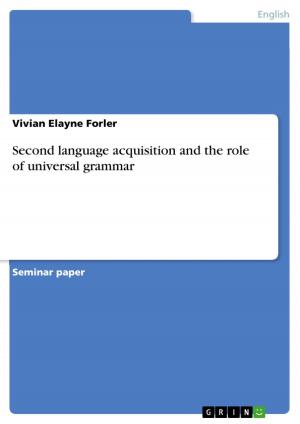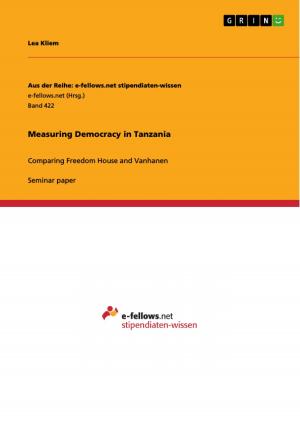Legal Harmonization. A case study on modelling the legislative processes of the European Union.
Nonfiction, Social & Cultural Studies, Political Science, Politics, History & Theory| Author: | Christian Rauh | ISBN: | 9783638516747 |
| Publisher: | GRIN Publishing | Publication: | July 3, 2006 |
| Imprint: | GRIN Publishing | Language: | English |
| Author: | Christian Rauh |
| ISBN: | 9783638516747 |
| Publisher: | GRIN Publishing |
| Publication: | July 3, 2006 |
| Imprint: | GRIN Publishing |
| Language: | English |
Seminar paper from the year 2004 in the subject Politics - Methods, Research, grade: 1,0, University of Constance, course: European Co-operation and Integration, 14 entries in the bibliography, language: English, abstract: The European Union seems to be a very attractive field for scholars of political science. This is probably due to its sui generis character but the even more likely motivation may stem from the intellectual challenges provided by the European decision-making process. This process consists of multiple actors - such as the member state governments or the European Commissioners - and of multiple levels - such as the subnational, the national or the supranational level. I do not want to claim that explaining this process is just a means for intellectual satisfaction, rather questions that affect more or less all citizens within the European Union can be answered this way. For example, if it is known which actor has which influence in the legislative process, any public or private interest group can figure out where to spend its resources effectively. A fruitful school of thought in this research area is the rational choice institutionalism. Scholars that can be assigned to this school are eager to find parsimonious explanations in order to cover a large class of events within the European legislation. Actors that are assumed to act (at least on average) rationally and to have preferences being exogenous to the decisionmaking processes under analysis are the base for such explanations. Formal or informal rules (that are 'institutions') enable or constrain these actors in pursuing their preferences (Aspinwall & Schneider 2000). Hence, modelling such institutions, figuring out their implications and comparing these results to empirical data is the most useful research strategy. Indeed modelling always means a simplification of reality without which one can not produce generaliseable statements. Researchers differ in their views on reality and may put emphasis on different aspects when establishing a model. Thus different results and therefore debates can emerge that, if at all, only can be solved by empirical examination using a reliable and valid research design. A famous example for such a debate is the one between George Tsebelis and Peter Moser on the implications of the cooperation procedure (Tsebelis 1994, Moser 1994). Here different interpretations of the legal basis lead to different statements on the power the European Parliament is expected to have under this procedure.
Seminar paper from the year 2004 in the subject Politics - Methods, Research, grade: 1,0, University of Constance, course: European Co-operation and Integration, 14 entries in the bibliography, language: English, abstract: The European Union seems to be a very attractive field for scholars of political science. This is probably due to its sui generis character but the even more likely motivation may stem from the intellectual challenges provided by the European decision-making process. This process consists of multiple actors - such as the member state governments or the European Commissioners - and of multiple levels - such as the subnational, the national or the supranational level. I do not want to claim that explaining this process is just a means for intellectual satisfaction, rather questions that affect more or less all citizens within the European Union can be answered this way. For example, if it is known which actor has which influence in the legislative process, any public or private interest group can figure out where to spend its resources effectively. A fruitful school of thought in this research area is the rational choice institutionalism. Scholars that can be assigned to this school are eager to find parsimonious explanations in order to cover a large class of events within the European legislation. Actors that are assumed to act (at least on average) rationally and to have preferences being exogenous to the decisionmaking processes under analysis are the base for such explanations. Formal or informal rules (that are 'institutions') enable or constrain these actors in pursuing their preferences (Aspinwall & Schneider 2000). Hence, modelling such institutions, figuring out their implications and comparing these results to empirical data is the most useful research strategy. Indeed modelling always means a simplification of reality without which one can not produce generaliseable statements. Researchers differ in their views on reality and may put emphasis on different aspects when establishing a model. Thus different results and therefore debates can emerge that, if at all, only can be solved by empirical examination using a reliable and valid research design. A famous example for such a debate is the one between George Tsebelis and Peter Moser on the implications of the cooperation procedure (Tsebelis 1994, Moser 1994). Here different interpretations of the legal basis lead to different statements on the power the European Parliament is expected to have under this procedure.















